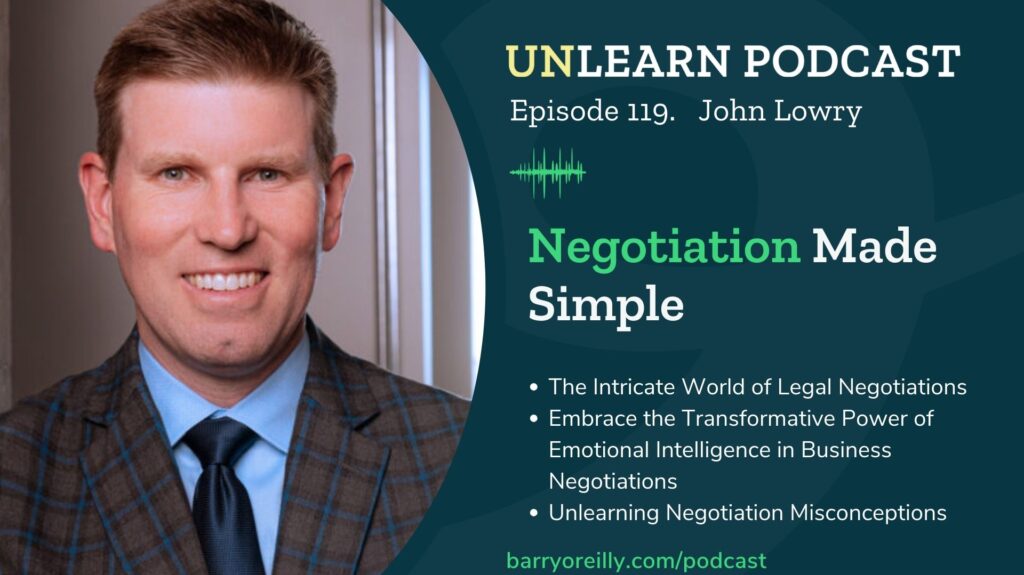Dr. John Lowry, CEO of Thrivence, a management consulting firm based in Nashville, TN, joins Barry O’Reilly on this episode of the Unlearn Podcast to talk about John’s journey from being a lawyer to teaching negotiation skills worldwide. John uses his diverse background in law, consulting, entrepreneurship, coaching, and university administration to bring a unique perspective to negotiation. He currently serves as the President of the Lowry Group and teaches at Pepperdine University’s Straus Institute for Dispute Resolution. In this week’s show, John shares insights from his bestselling book, Negotiation Made Simple. He emphasizes the importance of understanding human motivations in negotiation and highlights that decisions are often influenced more by emotion and ego than reason. By focusing on interest-based negotiation and avoiding positional debates, negotiators can create win-win deals in both business and personal situations.
From Lawyer to Negotiation Specialist
98% of John’s work as a lawyer centered around negotiating settlements. “What I learned was, … most of the problems started as human problems, then they became legal problems,” John tells Barry. “And then the really sophisticated negotiators, they got them resolved as human problems again. And the litigation process didn’t allow for the human element to come back in. It was only the negotiation process that allowed for that.” He became passionate about developing expertise in interest-based negotiation focused on the human problems underlying legal conflicts. He eventually started training others in these skills to facilitate deals and restore relationships earlier in disputes. He tells Barry that he focuses on negotiation more than litigation because “that was the process that brought healing to the injured party. That was the process that brought peace.” [Listen from 02:00]

Understanding Emotional Triggers in Decision-Making
A study by Harvard Business School showed that only 30% of business investment decisions are based on reason or analysis; 70% are driven by emotion. The emotional trigger, in particular, was found to be related to ego—how individuals felt about themselves when contemplating doing business with the other party. This insight highlights the significance of emotions in decision-making during negotiations. Barry reflects on this, emphasizing the importance of understanding how much the other party likes you, as it plays a crucial role in the negotiation process. [Listen from 8:40]
John discusses the transformative impact of recognizing and addressing clients’ emotional states, focusing on solving their fears and boosting their ego. This perspective, he notes, is especially valuable for sales teams: shift from self-aggrandizing presentations to understanding and catering to the emotional needs of your clients, he advises. [Listen from 10:30]
Counterintuitive Negotiation
Barry asks John what we should unlearn to become sophisticated negotiators. “Negotiation is a very counterintuitive process,” John responds. He debunks the misconception that negotiations always end with a win-win or a friendly resolution. He defends teaching competitive negotiation, arguing that it prepares individuals for the reality of negotiating with counterparts who are ready to compete. Competition can be cooperative in certain circumstances, he comments, emphasizing the role of ritual and uncertainty in negotiation dynamics. [Listen from 13:15]
Moving Beyond Positions to Uncover Interests
Negotiation is more about understanding why someone takes a certain position than proving who is right or wrong. A key aspect of successful negotiation is transitioning from positions to interests. John challenges the conventional approach of convincing the other party that your position is right. Instead, understand their underlying motives, fears, values, and goals – or “interests”. This shift, he argues, opens up room for creativity and better deals: “Most people, they have to unlearn being quick to respond to the position, to try to facilitate a concession, and they need to learn how to better understand what is causing that party to take the position. Because it’s that information that creates a lot of room for creativity and better deals can get done at that level than just fighting about who’s right and who’s wrong at the positional level.” [Listen from 17:45]
Tactical Insights for Effective Negotiation
Effective negotiation means focusing on creating a safe environment for sharing information. John suggests using open-ended questions to prompt discussions about the other party’s goals and motivations. He warns against using the word “why” because it can potentially trigger defensiveness. He also recommends honoring the other party’s interests. When both parties share their interests, they often realize that those interests are not in conflict. This often leads to surprisingly quick and successful deal resolutions. John tells Barry, “Once you get to that place, to …talking about the interest of both sides, all of a sudden, very difficult deals that have absolutely been a challenge to put together… get done in hours…. That’s the moment where you can become very powerful as a negotiator.” [Listen from 21:30]
Looking Ahead
John believes that in the future, neuroscience will help us understand how emotions and psychology impact decision-making and negotiation results. While AI can make data analysis more efficient, it probably won’t fully replicate the complexity of human interactions and the diverse interests involved. As Barry points out, humans still play a crucial role in setting machine parameters. However, the collaboration between humans and technology will keep advancing the field of neuroscience and negotiation. [Listen from 25:45]















